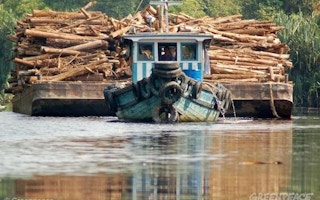One of the world’s largest paper companies is illegally harvesting trees and destroying the habitats of rare Sumantran tigers to produce products sold on the shelves of major US retailers, Greenpeace alleged in a report released on Thursday.
The report, which is based on findings from a year-long investigation by the environmental advocacy organization, claims that Asia Pulp and Paper is breaking Indonesian forest laws by using an endangered hardwood called ramin in its paper mills.
Greenpeace launched the report in Jakarta to a roomful of journalists by showing video footage of ramin logs and a film that documents how it collected evidence by gathering wood samples for laboratory testing.
It said it has handed its findings to the Indonesian Forestry Ministry and asked them to revoke the company’s operation permit. They are also calling on all companies who source pulp and paper from APP to sever their contracts.
The ministry said it plans to use the evidence for further investigation. But Greenpeace worries that if they don’t act quickly enough, APP may try to engineer a cover-up.
“We hope they can start today, because it’s very easy for APP to remove the ramin from the mill,” Mr Zulfahmi told Eco-Business. The forest campaigner for Greenpeace said he had met with ministry officials on Thursday to discuss the organisation’s findings.
Greenpeace said that evidence proves that ramin is regularly cleared from natural forests and sent to be pulped in the company’s mill in Sumatra. The pulp from that mill is then used to produce paper, consumer product packaging and tissue.
It is too difficult to determine if ramin is found in those products since the amount of pulp in the paper samples is so small, but supply chain analyses show that fiber from hardwoods growing in Sumatran peat swamps do exist in paper products that are exported to major US retailers, including Walmart and Xerox, the report says.
Greenpeace’s findings come at a time when companies are looking to satisfy increasing consumer demands for more sustainable products. They also reveal the difficulties Indonesia faces as it tries to reduce its carbon emissions from deforestation and protect its natural forests, the world’s third largest.
Ramin is found mostly in peat swamp forests in Kalimantan and Sumatra, areas that when harvested release huge amounts of harmful greenhouses gases. They are also important habitats for rare Sumatran tigers, of which experts say only around 400 still exist in the wild.
The wood was logged extensively in the 1990s for use in flooring and furniture. In 2001, the Indonesian government banned the logging of ramin under a ministerial decree to help preserve its dwindling numbers. Internationally, the trade in ramin is banned under the UN Convention on International Trade in Endangered Species.
But growing demand for products derived from the forest, including paper, tissue and packaging, has taken a toll on Indonesia’s rainforests. Greenpeace said around 28 per cent of Sumatra’s peat swamp forests were cleared between 2003 and 2009, and around a quarter of the logs from that clearing went to APP’s pulpwood suppliers.
APP produces more than 2 million tonnes of pulp and 5 million tonnes of paper and packaging each year, and it’s planning to expand production in the coming years.
Still, the company says it is committed to sustainable development. In 2003, it developed a legal origin verification and chain of custody system to ensure no illegal fiber was being harvested or being introduced into its fiber supply. Its website describes it as “one of the most stringent pulpwood fiber control systems in Indonesia.”
“We take very seriously any evidence of violation of the regulations concerning the protection of endangered tree species,” read a statement released Thursday in response to Greenpeace’s allegations. “A specialist APP team has been sent to the Indah Kiat mill to determine whether there is any substance to the claims.”
APP’s sister company Golden Agri Resources, both of which are grouped under the Indonesian conglomerate Sinar Mas, has implemented a policy to end deforestation, and Bustar Maitar, the head of Greenpeace’s Global Forest Network program, said he believes APP should follow the same practice if it wants to maintain its credibility.
“It’s really clear APP is not only breaking Indonesian laws, but also their own commitment,” said Mr Maitar. “Using ramin means APP is destroying peat land and the home of the Sumantran tiger.”
APP has come under increasing scrutiny in recent years from forest campaigners and advocacy organisations like Greenpeace and the World Wildlife Fund (WWF), who allege that it has engaged in illegal logging and harmed rare flora and fauna.
A WWF report released on February 15 described how the certification schemes cited by APP did not cover the most controversial operations of its wood suppliers, namely the clearing of high value conservation forest. “None of the certifiers are prepared to back APP’s claim that their certifications demonstrate its sustainability,” the statement read.
Greenpeace said that in addition to companies meeting their sustainability commitments, Indonesia’s forests need better policing.
“If Indonesia wants to engage in international trade, it needs to follow international standards,” said Mr Bustar.
Kraft, Nestle and Mattel have all suspended purchases from APP over concerns about illegal logging.

















